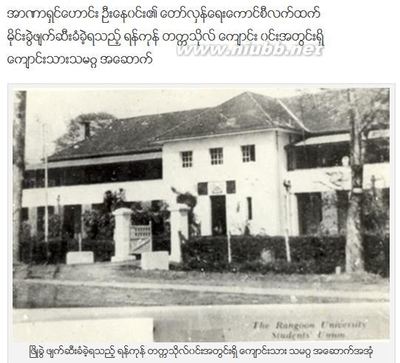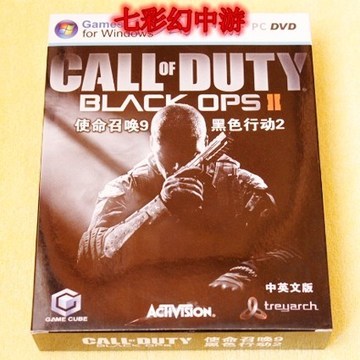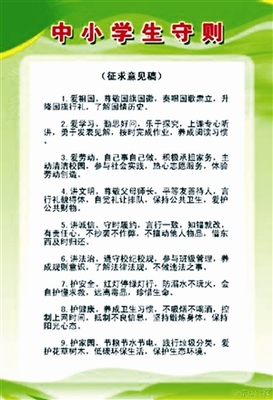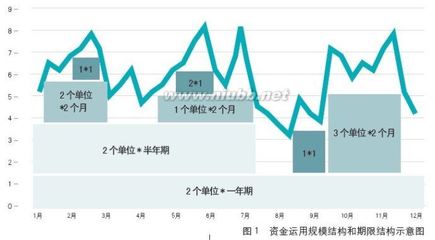经历77事变的学生看今日缅甸
7th July Student’sPerspective of Burma
By Kanbawza Win
July 3, 2013 2013年7月3日
缅甸77事变纪念日再度来临
再一次难忘伤心回忆7月7日发生的事件
确切地说是半个世纪加一年前
在1962年7月7日
-缅军‘屠夫盛伦’实施
-统帅耐温命令
-昂季上校支持
枪杀数百仰光大学和平示威学生
次日缅军以炸弹夷平仰光大学学生联合会大楼
从那时起缅甸军人集团成功地扼杀全国思想
对缅甸实现‘奥威尔式统治’
把国家推到到全世界阶梯底部
7th July Student’s Perspective of Burma
Thu, 2013-07-0400:44 — editor By Kanbawza WinOnce again the unforgettable sad memories of the 7th Julyincident came around, when the Tatmadaw (at that time implementedby butcher Sein Lwin and ordered by Ne Win supported by ColonelAung Gyi) gun down hundreds of peaceful students demonstratingRangoon University students on 7th July 1962, to be exact half acentury plus one year ago. Rangoon University Students’ Union building wasdemolished by dynamite, and many students in the building werekilled which now became known as the 7 July Students’massacre.
The next day the Rangoon University Student’s Union was blown upand since then the Tatmadaw was able to snuff out the brainsof the country and thus was able to implement its Orwellian ruleBurma up to this day dragging the country to the bottom of theladder of the world.
Today while the quasi military government tries to shed itspariah status and the Western media is full of praises ofdemocratic changes; it should give pause to the true nature of theBurmese Tatmadaw control regime. Underneath the trope of“democratic reform” lie some unpalatable truths. Not content withreserved military powers in government, parliament, and nationalbudgets and untrammelled executive control of national security,the regime has mobilized the full arsenal of a self-servingrepressive Junta to deny ethnic nationalities, not just theirrights to self-determination but also to their fundamentalhumanity.Fascism and militarism are the enduring handmaidens ofthis “new era” of politics and the paradox is that it could foolthe Western media.
While the headline-grabbing democratic reforms are welcome,resulting in millions of dollars in international development andhumanitarian assistance, many believe they fail to address theeconomic hardships of Burma‘s 58 million people. Dr Zarni, founderof the Free Burma Coalition and a fellow at the London School ofEconomics, says
“Thein Sein’s reforms are largely geared towards creating a`late developmental state’ along the lines of Vietnam and China…Sadly, the West and the rest alike are choosing to overlook theapparent pitfalls of Burma‘s reforms, ignoring the cries of thewretched people of a new Burma.”
It seems that change is happening in the upper levels ofgovernment but the lives of the people are largely the same asbefore. While there are high hopes that the recent easing ofinternational sanctions will change things, Burma remains one ofthe poorest countries in Southeast Asia.
Ordinary people see little tangible improvement in theirday-to-day lives, and inflation is having an adverse effect on thelives of many Burmese.
According to the UN’s most recent Integrated Household LivingConditions Assessment, the average proportion of total householdbudget spent on food is 68 percent 74 percent for the poorest 30percent of the population.
A third of the country’s population lives below the povertyline, according to the World Bank, report and yet the worldeulogizes Burma.
Since Thein Sein came to power, some 75,000 people have beendisplaced and humanitarian needs are growing, reports the UN Officefor the Coordination of Humanitarian Affairs (OCHA). At the sametime, more than 100,000 people, nearly all Rohingyas, havebeen displaced in Western Arakan State, after inter-communalviolence between ethnic Rakhine Buddhists and RohingyaMuslims erupted in June fanned by the military hardliners and theUSDP. These conflicts are a major test for the Thein Seingovernment. Burma’s failure to contain sectarian violence in Arakanand Muslim hold accountable those responsible calls into questionthe Burmese government’s stated goal of becoming arights-respecting, multi-ethnic state. Political leaders haveconflicting views about how power should be shared under theillogical Nargis Constitution of 2008 as well as after the 2015election; while many believe what is needed now is moral leadershipto calm tension and seek compromises if divisive confrontation isto be avoided.
“An NLD landslide may not be in the best interests of theparty or the country, as it would risk marginalizing threeimportant constituencies: the old political elite, the ethnicpolitical parties and the non-NLD democratic forces. If thepost-2015 legislatures fail to represent the true political andethnic diversity of the country, tensions are likely to increaseand fuel instability. The main challenge the NLD faces is not towin the election, but to promote inclusiveness andreconciliation,” the ICG report says.
Although Thein Sein has spearheaded unprecedented change inBurma, many remain cynical about his motives for allowing Daw AungSan Suu Kyi to run for election. Clearly the government is usingher image as a democracy icon to promote and protect their way ofreform. Their strategy is one of using your enemy’s good name toreach your own objective. The impetus behind the government’sdemocratic reforms goes beyond just promoting foreign trade. By thewindow-dressing “reforms to please Westerngovernments” and enable the lifting of sanctions.
“The dictatorship hurt the nation’s pride. But they also wantto lead the change. There will be less electoral fraud in 2015, butat the same time they will be smarter and will effectively usetheir political framework to weaken opposition. Of course,monitoring from the UN and international community isessential,”
Mark Farmener, Director of the London-based Burma Campaign UKdescribes the reforms to date as “top down and skindeep”.
Censorship laws have not been repealed, though how they havebeen applied has been changed, he said, adding that while there iscurrently more freedom for certain subjects to be reported, others,such as ethnic issues, remain banned. “Media are still notallowed to criticize the government,” he said.
According to a report entitled Vitality, Perception andReality in Burma’s Democratic Reform by the Geneva Centre forSecurity Policy (GCSP), self-censorship continues as manyjournalists are unsure what they can write about without fear ofgovernment reprisal. The report says internal factions in thegovernment are delaying reforms. There is evidently an internalpower struggle in the government, between the government and themilitary and potentially between the president and his supportersand potentially with more hard line factions in the governmentsupported by the Tatmadaw.
Of course the government released some political prisoners andrelaxed restrictions on NGOs, and promised freedom for unions.Suspension of Myitsone dam project funded by China sends a messagethat the government is listening to civil society opponents of theproject. These are small steps in the right direction, but do notdispel concerns about human rights abuses and constraints onpolitical freedom which the Tatmadaw in lieu with the regimeis imposing on the people of Burma. The mechanisms of repressionremain in place and the reform process remains easily reversible,cautioning against giddy exuberance.
Key decision-makers in Burma want sanctions lifted andunderstand that the road to rejoining the international communityand gaining legitimacy leads through the front gate of the housewhere Daw Aung San Suu Kyi spent most of the past two decades underhouse arrest. Jailing or marginalizing her was always a dead-endstrategy because only she has the moral authority to promotenational reconciliation and normalize external relations. But hereagain here, her popularity has began to wane in terms of ethnicnationalities especially in Kachin and Rohingya cases whenrealpolitik takes over her rationale. However, if comparedto the West’s Business always overrules the Conscience it isfar better.
The U.S., Japan and the EU have responded carefully toNaypidaw's opening, and opening the spigots of developmentassistance depends on further evidence of reform. Investors arealso waiting for a strengthening of the rule of law to ensure theirinterests are protected.
No doubt the current government is dominated by former militaryofficers (26 of 30 Cabinet ministers) and holds power only becauseof widespread election fraud in 2010, so there are good reasons toremain wary. The Tatmadaw men they retired from isresponsible for the slaughtering and jailing of monks and studentsin the 1988 uprising and again during the Saffron Revolution in2007 is still very much in control.. The current NargisConstitution of 2008, one imposed following a rigged referendumin 2008, allocates 25 percent of seats to the military and gives itde facto veto powers will be the hall marks of the coming 2015elections.
Burma has been nominally under civilian rule for the past twoyears, but the government officials leading the transition todemocracy today are largely the former apparatchiks of the militarygovernments that ruled the country for more than five decades.
Burma unlike other countries emerging from years of extremerepression in that there have been few calls for trials, war crimestribunals or even the kind of truth-and-reconciliation commissionthat helped South Africa move beyond apartheid. The tone has beenset by the most famous of the thousands of the country’s formerpolitical prisoners, Daw Aung San Suu Kyi, the political oppositionleader and Nobel Peace laureate who spent a total of 15 years underhouse arrest before her release in 2010. For Daw Aung San Suu Kyiand her party, which leads the opposition in Parliament, there is acritical political element to the pragmatism. The next generalelections are in 2015, and for them to proceed smoothly without athreat of a return to military rule, many are urging a go-softlyapproach.
To the outside world, Burma’s transition from military rule tofledgling democracy appeared jarringly forgiving. Even those whosuffered torture and years of solitary confinement as politicalprisoners say there is no point calling for retribution. They citethe role of Buddhism, certain pragmatism and, in some cases,political calculations for their restraint. The old elite — thegenerals and the businessmen who were close to them — arereinventing themselves.
The most stark example maybe Khin Nyunt, the former head ofmilitary intelligence, once feared and loathed for the torture hisagents inflicted, now runs an art gallery. Burma’s former dictator,Senior General Than Shwe, is reportedly enjoying a peacefulretirement in secluded compound, while family members who grew richduring his military rule live luxurious lifestyles that contrastwith the crippling poverty that afflicts most of the country. And aformer top general in what was one of the world’s most repressivegovernments, Thein Sein, is president, hailed both inside thecountry and abroad as a great reformer is now in nominated list forthe Nobel Peace Prize. May be I have gone insane witnessing allthese illogical aspects.
Bur such omens doesn’t augur well for an old 7th July student,some of whom are still surviving, seeing the contemporary Historyof the Union of Burma unfolding in front of our eyes. The wholeconcept these days is that the hardliner of the Tatmadaw,who are hand in gloves with the USDP are trying to draw the reformsback by encouraging the extremist Buddhist monks to practice thetyranny of the majority and creating religious and sectarian strifenot satisfied with the ethnic cleansing of the ethnicnationalities. Will the Thein Sein administration carry on thereforms with this scenario is everybody’s guess?
A dotage like me dream to let our younger generation knows ofwhat Rangoon University is like which in Burmese we lovingly saysliterally translated as a serene island oflearning,M.i> not that I dream of the regimereconstructing the Student’s Union building (donated by U Nyo)where we used to hang around its teashop or the four hostelsAmra, Ramanya, Mandalay and Toungoo Halls (whose studentswere the most to be killed on that fateful day) but that whatRangoon University think of today, Burma will think oftomorrow. Even President Obama was being tricked to give aspeech at its Convocation Hall, we visualize that an ordinarypeople of Burma don’t have any chance. However 7th July incidentwill go down in the annals of history as the first attempt by thestudents to unmask the true colour of Tatmadaw and thatmen may come and men may go, but 7 July incident will liveforever.
Footnote:
Speech of Brad Adams, Asia director at Human Rights Watch
Mizzima Sein Win comments in interview with ICG
Kingston; Jeff, Burma and the search for democracy. Abook repot of Aung San Suu Kyi and Burma's Struggle for Democracy,by Bertil Lintner
Fuller;Thomas, A Myanmar in Transition Says Little of PastAbuse New York Time 14-6-2013
- Asian Tribune -
Burma'sUnforgettable 7 July Students Massacre

7 July 2011
On 7th July 1962, Burmese university students were massacred andRangoon University Students 0 8 Union building was dynamited downwhere students were still inside.
General Ne Win who came to power on 2 March 1962 after formingthe Revolutionary Council tried to crush the students 0 8activities by tightening the university regulations which causedwidespread resentment amongst the students.
The dictator General Ne Win abolished University Act, and theUniversity Council and all University Affairs were taken over bythe Revolutionary Council.
On 7th July 1962, students called the meeting protesting theRevolutionary Council 0 8s unfair rules and regulations at theRangoon University Students 0 8 Union building.
Military responded by arresting the student leaders. Studentsgathered in front of the students 0 8 union building, shoutedslogans and occupied the campus when they learnt that students 0 8leaders were arrested.
The military surrounded the campus, throwing tear gas into thegathered crowds and crush the students 0 8 protest by usingexcessive force and successively declared martial law.
Early on the morning of 8 July, the historic Rangoon UniversityStudents 0 8 Union building was demolished by dynamite, and manystudents in the building were killed which now became known as the7 July Students 0 8 massacre.
General Ne Win notoriously justified his action bysaying 0 9Dar Dar Chin and Hlan Hlan Chin shinmae 0 0 which is laterally meaning aggressive challenging words inBurmese saying 0 9I will fight Sword with Swordand Spear with Spear (to wipe out the opposition) 0 0 but inreality he killed un-armed non-violent students protesters withguns and dynamites.
Burma Democratic Concern (BDC) will always remember fallenheroes ofBurma.
 爱华网
爱华网



